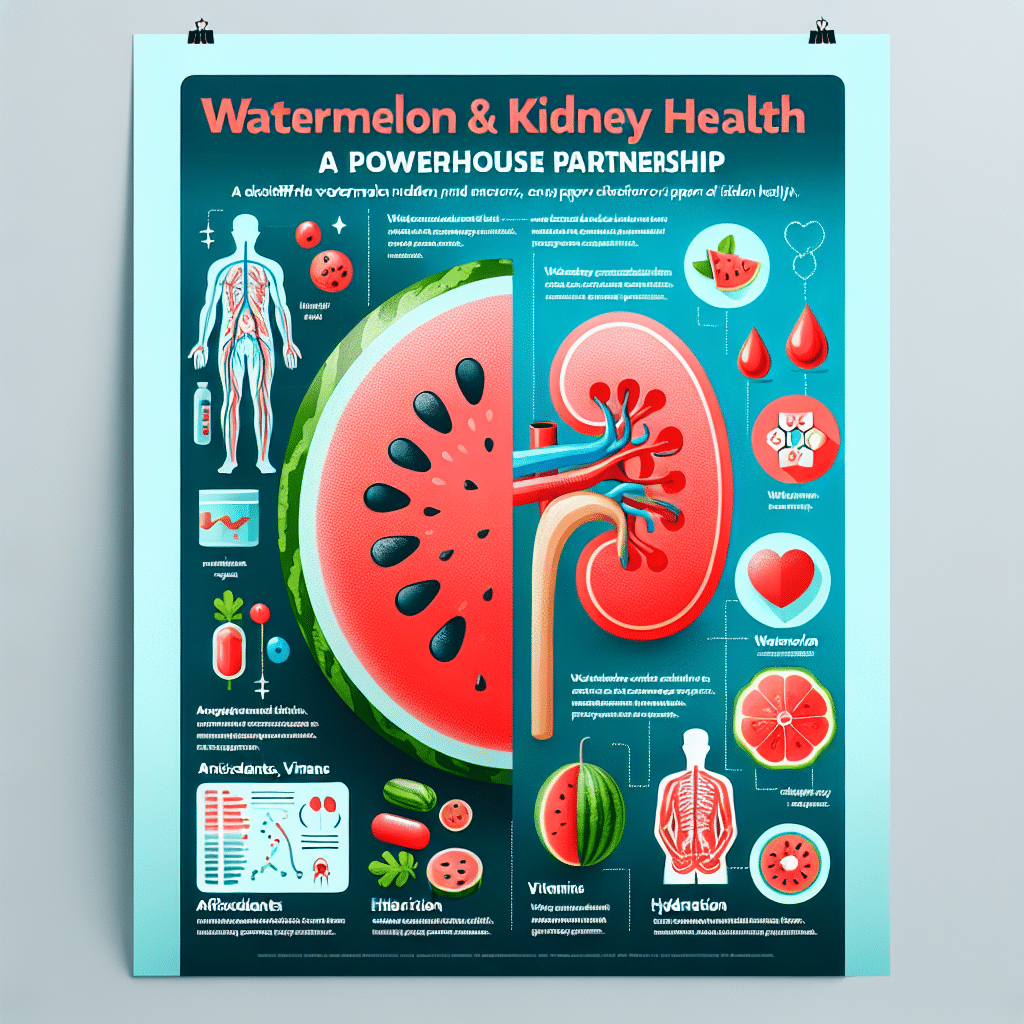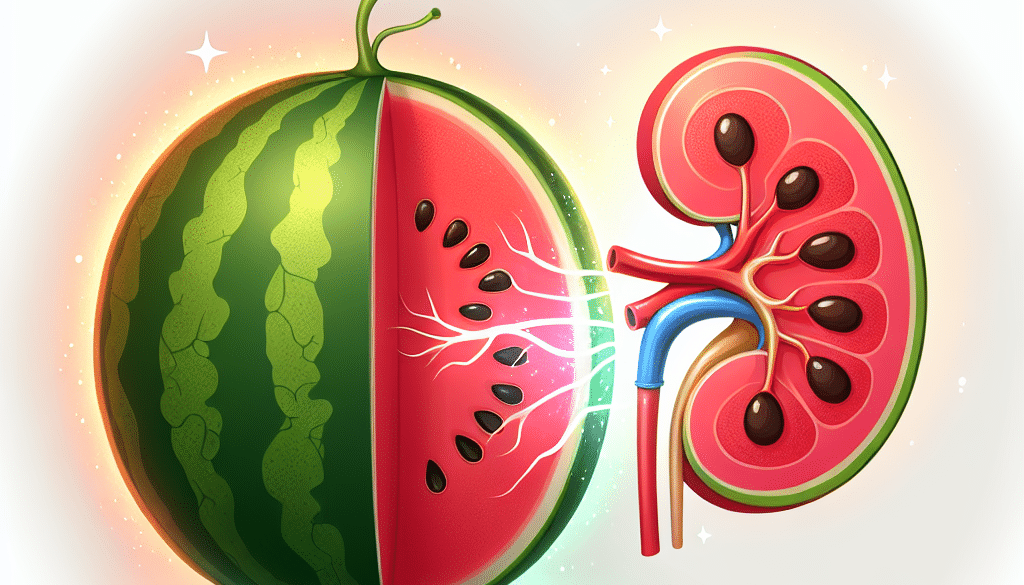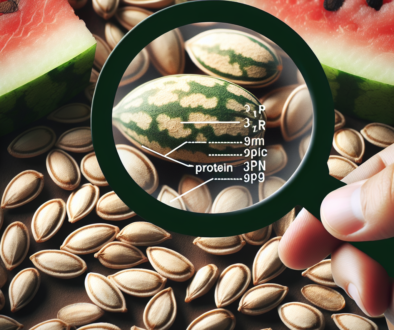Is Watermelon Good For Kidneys?
-
Table of Contents
- Watermelon and Kidney Health: A Refreshing Boost or Just a Myth?
- The Nutritional Profile of Watermelon
- Hydration and Kidney Function
- Potassium Content and Kidney Health
- Antioxidants and Kidney Protection
- Watermelon as a Diuretic
- Impact on Kidney Stones
- Considerations for Chronic Kidney Disease
- Case Studies and Research
- Conclusion: A Juicy Addition to Kidney Health
- Discover ETprotein’s Protein Products
Watermelon and Kidney Health: A Refreshing Boost or Just a Myth?

Kidneys are vital organs that play a crucial role in maintaining overall health by filtering waste products, excess water, and other impurities from the blood. These waste products are then excreted through urine. Given the importance of kidney health, it’s no surprise that diet is often scrutinized for its impact on these organs. Watermelon, a popular summer fruit, is often touted for its health benefits, but is it good for your kidneys? Let’s dive into the research to find out.
The Nutritional Profile of Watermelon
Understanding the nutritional content of watermelon is essential to assess its potential impact on kidney health. Watermelon is composed of about 92% water, making it an excellent source of hydration. It’s also rich in vitamins and minerals, including vitamin C, vitamin A, potassium, magnesium, and antioxidants like lycopene and cucurbitacin E.
Hydration and Kidney Function
Proper hydration is critical for kidney function. The kidneys require enough fluids to filter and eliminate waste from the body. Watermelon’s high water content can contribute to overall fluid intake, potentially aiding the kidneys in their essential functions.
Potassium Content and Kidney Health
Potassium is a mineral that plays a significant role in maintaining fluid and electrolyte balance in the body. It’s also important for nerve function and muscle contraction. While watermelon contains potassium, it’s considered a lower-potassium fruit compared to others, which may be beneficial for individuals with chronic kidney disease (CKD) who need to monitor their potassium intake.
Antioxidants and Kidney Protection
Antioxidants are substances that can prevent or slow damage to cells caused by free radicals. Watermelon is rich in antioxidants like lycopene and vitamin C, which may help reduce inflammation and oxidative stress—two factors that can contribute to kidney damage.
- Lycopene: Studies have suggested that lycopene may help lower the risk of certain chronic diseases and could have a protective effect on the kidneys, particularly in patients with CKD.
- Vitamin C: As an antioxidant, vitamin C helps protect the body from damage caused by free radicals. It also supports the immune system and is essential for the growth and repair of tissues throughout the body, including the kidneys.
Watermelon as a Diuretic
Watermelon has natural diuretic properties, which means it can help increase urine production. This can be beneficial for flushing out toxins from the kidneys and reducing the risk of kidney stones. However, for individuals with kidney disorders that require regulated fluid intake, it’s important to consume watermelon in moderation.
Impact on Kidney Stones
Kidney stones are hard deposits made of minerals and salts that form inside the kidneys. Diet plays a significant role in the formation and prevention of kidney stones. Watermelon’s high water content and diuretic properties can help dilute the substances in the urine that lead to stones. Additionally, the citrulline in watermelon can help lower the acidity of urine, which may further reduce the risk of stone formation.
Considerations for Chronic Kidney Disease
For individuals with CKD, managing diet is crucial. While watermelon has many potential benefits, it’s important to consider its potassium content. Although watermelon is a lower-potassium fruit, portion size should still be monitored to avoid excessive potassium intake, which can be harmful to those with advanced CKD.
Case Studies and Research
Several studies have explored the relationship between fruit consumption and kidney health. For example, research has indicated that a diet rich in fruits and vegetables, including watermelon, can help reduce blood pressure—a major risk factor for kidney disease. Other studies have focused specifically on the antioxidants in watermelon and their potential protective effects on the kidneys.
Conclusion: A Juicy Addition to Kidney Health
In conclusion, watermelon can be a healthy addition to the diet for most people, including those concerned about kidney health. Its high water content, antioxidants, and diuretic properties may offer benefits such as improved hydration, reduced risk of kidney stones, and potential protection against kidney damage. However, as with any dietary consideration, moderation is key, especially for those with CKD who need to monitor their potassium intake. Always consult with a healthcare provider or dietitian before making significant changes to your diet, particularly if you have underlying health conditions.
Discover ETprotein’s Protein Products
If you’re looking to complement your diet with high-quality protein sources, consider ETprotein’s range of organic bulk vegan proteins. Their watermelon seed protein is an excellent choice for those seeking a plant-based protein option that’s gentle on the kidneys. ETprotein’s products are non-GMO, allergen-free, and boast a neutral taste, making them a versatile addition to any diet.
About ETprotein:
ETprotein, a reputable protein and L-(+)-Ergothioneine (EGT) Chinese factory manufacturer and supplier, is renowned for producing, stocking, exporting, and delivering the highest quality organic bulk vegan proteins and L-(+)-Ergothioneine. They include Organic rice protein, clear rice protein, pea protein, clear pea protein, watermelon seed protein, pumpkin seed protein, sunflower seed protein, mung bean protein, peanut protein, and L-(+)-Ergothioneine EGT Pharmaceutical grade, L-(+)-Ergothioneine EGT food grade, L-(+)-Ergothioneine EGT cosmetic grade, L-(+)-Ergothioneine EGT reference grade and L-(+)-Ergothioneine EGT standard. Their offerings, characterized by a neutral taste, non-GMO, allergen-free attributes, with L-(+)-Ergothioneine purity over 98%, 99%, cater to a diverse range of industries. They serve nutraceutical, pharmaceutical, cosmeceutical, veterinary, as well as food and beverage finished product distributors, traders, and manufacturers across Europe, USA, Canada, Australia, Thailand, Japan, Korea, Brazil, and Chile, among others.
ETprotein specialization includes exporting and delivering tailor-made protein powder and finished nutritional supplements. Their extensive product range covers sectors like Food and Beverage, Sports Nutrition, Weight Management, Dietary Supplements, Health and Wellness Products, and Infant Formula, ensuring comprehensive solutions to meet all your protein needs.
As a trusted company by leading global food and beverage brands and Fortune 500 companies, ETprotein reinforces China’s reputation in the global arena. For more information or to sample their products, please contact them and email sales(at)ETprotein.com today.














